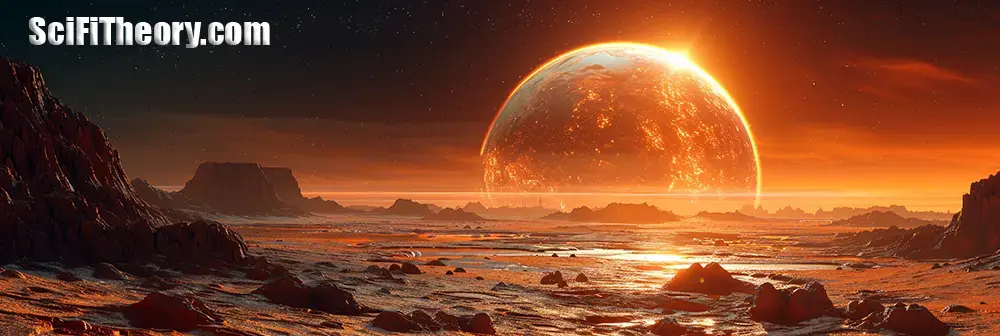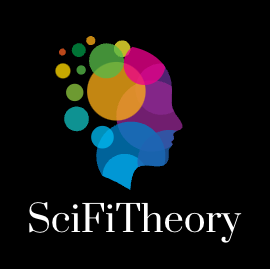Space Exploration
Space Exploration is a foundational theme in science fiction, encompassing journeys to other planets, star systems, and galaxies. These narratives often explore the challenges and wonders of interstellar travel, the colonization of distant worlds, and encounters with alien environments and civilizations.
Interstellar Travel: Stories like Arthur C. Clarke’s “2001: A Space Odyssey” delve into the technical and philosophical aspects of space travel. Clarke’s work, later adapted into a film, focuses on a mission to Jupiter (originally Saturn) and the discovery of a mysterious monolith that influences human evolution. This narrative highlights both the potential and the peril of venturing into the unknown.
Colonization of Distant Worlds: Colonizing other planets is a common theme, exploring human resilience and adaptability. For instance, Kim Stanley Robinson’s “Red Mars” series details the terraforming and settlement of Mars, emphasizing the scientific and political challenges of creating a new society on a different planet.
Encounters with Alien Civilizations: Encounters with extraterrestrial life provide a platform for exploring themes of communication, culture, and conflict. In “The Martian Chronicles” by Ray Bradbury, the colonization of Mars by humans leads to profound and often tragic interactions with the indigenous Martians, reflecting on themes of colonization and cultural erasure.
Technological and Scientific Innovation: Science fiction often imagines advanced propulsion systems and spacecraft. Concepts like faster-than-light travel and generation ships are explored to address the vast distances between stars. These elements are crucial in creating believable and engaging space exploration stories, as seen in Alastair Reynolds’ “Revelation Space” series, which incorporates scientifically plausible technologies and complex characters navigating interstellar intrigue and ancient mysteries.
Influence on Real Science: Science fiction has inspired many real-world advancements in space exploration. The depiction of space travel in literature and film has spurred interest and investment in space technology. NASA’s Apollo missions and ongoing Mars exploration efforts often draw parallels to the speculative missions described in science fiction.
Modern Contributions: Contemporary works continue to expand the boundaries of space exploration in science fiction. Andy Weir’s “The Martian” combines rigorous scientific detail with a gripping survival story, while Christopher Nolan’s film “Interstellar” explores the theoretical possibilities of wormholes and time dilation, pushing the genre to explore new scientific frontiers and human experiences.
Time Travel
Time Travel is another popular theme in science fiction, allowing characters to journey through past and future timelines via time machines or natural phenomena such as wormholes. This trope often explores the consequences of altering history, the paradoxes that arise, and the philosophical questions about fate and free will.
Altering History and Paradoxes: Time travel stories frequently deal with the implications of changing past events. These narratives explore the potential for creating alternate realities or “butterfly effects,” where small changes in the past lead to significant differences in the present and future. The concept of paradoxes, such as the famous “grandfather paradox,” where a time traveler might prevent their own existence, is a common theme.
Philosophical Questions: Time travel often raises profound philosophical questions about destiny, free will, and the nature of time itself. These stories challenge characters and readers to consider whether the future is predetermined or if it can be altered by human actions. They also explore the ethical dilemmas of time travel, such as the morality of changing historical events for personal gain or the greater good.
Classics and Modern Works: H.G. Wells’ “The Time Machine” is one of the earliest and most influential time travel narratives, presenting a vision of the future and reflecting on social issues of Wells’ time. Modern series like “Doctor Who” continue to delve into the complexities of time travel, with the Doctor navigating various timelines, encountering historical figures, and addressing the consequences of altering events.
By exploring these themes, time travel in science fiction offers a rich and engaging way to examine human nature, morality, and the intricate fabric of time and existence.
Advanced Technology
Advanced Technology in science fiction encompasses robots, artificial intelligence, and cybernetics, serving as a central trope that examines the integration of technology into human life and its potential for both enhancement and danger.
Robots and Artificial Intelligence: Isaac Asimov’s “I, Robot” is a seminal work that explores the ethical and moral implications of creating sentient robots. Asimov’s stories introduce the Three Laws of Robotics, which are designed to prevent robots from harming humans. However, the narratives often highlight the complexities and unintended consequences of these laws, prompting readers to consider the responsibilities and potential risks associated with advanced AI.
Cybernetics and Human-Machine Integration: In the cyberpunk worlds of William Gibson’s “Neuromancer,” the boundaries between human and machine blur. This genre delves into themes of cybernetics, where humans enhance their bodies and minds with technological implants, raising questions about identity, autonomy, and what it means to be human. Cyberpunk often depicts dystopian futures where technology exacerbates social inequalities and corporate power.
Ethical and Moral Questions: Stories featuring advanced technology frequently address the ethical dilemmas of creating and using sentient machines. They explore themes such as the potential loss of privacy, the impact on employment and social structures, and the possibility of machines surpassing human intelligence and control. These narratives encourage readers to reflect on the moral responsibilities of developing and integrating advanced technologies.
Influential Works: Besides Asimov and Gibson, many other authors and works have significantly contributed to this theme in science fiction. Philip K. Dick’s “Do Androids Dream of Electric Sheep?” (the basis for the film “Blade Runner”) explores the nature of humanity and empathy in a world where robots (replicants) are almost indistinguishable from humans. The “Matrix” trilogy by the Wachowskis delves into a future where humans are trapped in a simulated reality controlled by intelligent machines, questioning the nature of reality and human agency.
By examining the integration of advanced technology into human life, science fiction provides a rich medium for exploring the potential benefits and dangers of technological progress, prompting critical reflection on the future of humanity and our relationship with machines.
Alien Life
Encounters with extraterrestrial beings and civilizations are a staple of science fiction, offering a mirror to humanity’s own cultural and ethical concerns. These stories often serve as allegories for real-world issues, exploring themes of xenophobia, communication barriers, and the potential for mutual understanding or conflict.
Friendly Interactions: Carl Sagan’s “Contact” exemplifies the theme of friendly extraterrestrial encounters. The story follows Dr. Ellie Arroway as she discovers an alien transmission and leads humanity’s first communication with an advanced extraterrestrial civilization. Sagan’s narrative emphasizes themes of curiosity, the search for knowledge, and the potential for peaceful coexistence and mutual understanding between different species.
Hostile Invasions: Conversely, H.G. Wells’ “The War of the Worlds” depicts a more hostile interaction. The novel describes the invasion of Earth by Martians with superior technology and destructive intentions. This narrative explores themes of survival, the vulnerability of humanity, and the fear of the unknown, reflecting anxieties about imperialism and technological warfare.
Themes and Reflections: These encounters challenge readers to consider humanity’s place in the cosmos and the possibility of life beyond Earth. They often reflect on human nature, exploring how we might react to beings vastly different from ourselves. For instance, stories like Arthur C. Clarke’s “Rendezvous with Rama” and Stanislaw Lem’s “Solaris” delve into the complexities of understanding and communicating with truly alien intelligences, highlighting the limitations of human perception and the potential for misinterpretation.
Cultural and Ethical Concerns: Science fiction frequently uses extraterrestrial encounters to address issues of cultural conflict and ethical dilemmas. For example, Orson Scott Card’s “Ender’s Game” series explores the morality of preemptive war and the consequences of dehumanizing an enemy. Similarly, Ursula K. Le Guin’s “The Dispossessed” examines the clash of different social and political systems through the lens of interstellar travel and communication.
Impact on Readers: By presenting these speculative scenarios, science fiction encourages readers to think critically about the potential consequences of encountering extraterrestrial life. It raises questions about how we define intelligence, what it means to be human, and how we might bridge the vast cultural and biological divides between species.
In summary, encounters with extraterrestrial beings in science fiction provide a rich platform for exploring profound questions about humanity, ethics, and our place in the universe. Through imaginative and thought-provoking narratives, these stories challenge readers to consider the broader implications of contact with other forms of life.
Dystopian and Utopian Societies
Dystopian Societies: Dystopian narratives in science fiction present exaggerated visions of current social, political, and economic structures taken to extremes, serving as cautionary tales about the potential consequences of unchecked power and technological advancement.
– George Orwell’s “1984”: This seminal work depicts a totalitarian regime where the government exercises extreme control over every aspect of life, employing surveillance, propaganda, and brutal enforcement to maintain its power. The novel critiques the dangers of totalitarianism and the loss of individual freedoms, highlighting the potential dark side of technological advancements in surveillance and information control.
– Margaret Atwood’s “The Handmaid’s Tale”: Set in a theocratic society where women’s rights are severely restricted, this narrative explores themes of gender oppression and the misuse of religious and political power. Atwood’s dystopia serves as a stark warning about the fragility of women’s rights and the potential for regression in societal norms.
Utopian Societies: In contrast, utopian narratives imagine ideal societies that reflect humanity’s highest aspirations, often highlighting the potential for progress and harmony through technological and social innovations.
– Ursula K. Le Guin’s “The Dispossessed”: This novel presents a vision of an anarchist society on the moon Anarres, contrasting it with the capitalist society on the planet Urras. Le Guin explores themes of political ideology, economic inequality, and the possibility of achieving a more equitable and just society through communal living and mutual aid.
– H.G. Wells’ “A Modern Utopia”: Wells imagines a world governed by a benevolent and rational ruling class, where science and reason lead to a harmonious and efficient society. This utopian vision reflects the optimism of the early 20th century about the potential of scientific and technological progress to improve human life.
Impact and Reflection: These dystopian and utopian narratives not only entertain but also provoke thought about the future of humanity and the ethical implications of our actions. By presenting exaggerated or idealized visions of society, science fiction invites readers to explore the possibilities of tomorrow and consider the consequences of current trends and behaviors.
Ethical Implications: Both dystopian and utopian stories prompt readers to reflect on ethical questions such as the balance between individual freedoms and societal control, the role of technology in shaping human life, and the potential for social and political systems to either uplift or oppress.
Through imaginative and speculative storytelling, science fiction provides a unique platform for exploring the depths of human potential and the possibilities for future societal evolution. By examining these common themes and tropes, the genre encourages critical thinking about our actions today and their impact on the world of tomorrow.





Leave a Reply